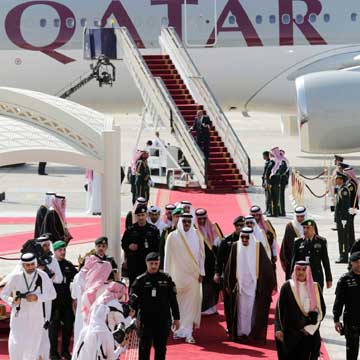 New Delhi:
New Delhi: By severing ties with Qatar, the Saudi-led coalition has declared a diplomatic war with the Emirate. This will not just strain ties within the Gulf, but will also impact other countries that have close ties in the region. While most analysts say the move will not impact India immediately, there will be repercussions if the tensions continue and differences are not resolved.
Political ties in the regionTensions have been rising between Saudi Arabia and Qatar, which is a part of the Islamic Military Alliance, as well as part of the Saudi coalition taking part in the Yemen intervention, for some time now. While the reasons given for the decision are ostensibly Qatar’s support to “regional terror” and the Muslim Brotherhood, which challenges the Saudi monarchy as well as the regimes in many countries in the Gulf, the immediate trigger appears to be the Qatari Emir Al-Thani’s ties with Iran, and his decision to take a phone call from Iranian President Rouhani in the end of May.
In the past few days, there has been an increased call from the Kingdom of Saudi Arabia (KSA), as well as UAE, Bahrain and other countries for Qatar to proclaim “which side it is on.”
India has traditionally stayed out of the “Shi’a-Sunni”, “Arab-Persian” or “Wahabbi-Salafi” divides, and maintained good ties with all, but a further fragmenting West Asia will require even more deft diplomacy to keep these ties untouched by the tensions.
Prime Minister Narendra Modi visited Qatar and received Emir Al-Thani in 2016 and has also forged very close strategic partnerships with the UAE and Saudi Arabia, which are crucial to his outreach in the region.
Trade and manpowerIndia sources more than half of its energy import needs from countries in the Persian Gulf. Six million Indians live and work in West Asia and they sent home about $63 billion last year.
Energy imports may not be affected immediately, unless the Gulf countries follow through with sanctions. However, as in the case of Yemen, Libya, Lebanon and other countries, any tensions in the region have an immediate impact on thousands of Indian workers.
In Qatar in particular, there are 6,00,000 Indian workers, many of them on projects related to the 2022 FIFA world cup. In addition, India has significant trade ties with the country (Qatar is India’s 19th biggest trading partner with about $9bn in trade), although its trade ties are much stronger with the UAE and the KSA (who rank 3rd and 4th respectively, with about $49 billion and $26 billion, according to Commerce Ministry figures in 2015). After Mr. Modi’s visits in the region, India had hoped for considerable investments from both the UAE and Qatar’s Sovereign Wealth Funds.
Cooperation in fighting terrorThe KSA and the UAE are important partners for India on counter-terrorism cooperation and intelligence sharing. Yet it can’t be denied that together with Qatar, these countries have traditionally supported extremist groups that now control parts of Afghanistan, Syria and Iraq.
The KSA, the UAE and Pakistan were the only countries to support the Taliban regime in Afghanistan, and the Qatari capital hosts the Taliban’s office to enable it to conduct dialogue, which was supported by the other Gulf countries. It remains to be seen how the latest schism will affect the global war on terrorism.
Air travelBesides cutting off diplomatic ties, the Saudi coalition has also decided to cancel Qatar Airways flights to their countries. This will affect Indian passengers who hoped to use Doha as a hub to get to other destinations in the Gulf.
At present, Qatar Airways flies about 24,000 passengers a week from India, ranking just behind the UAE’s Emirates and Eithad Airways. In recent months, Qatar Airways has confirmed that it wants to set up a fully-owned subsidiary domestic airline in India, for which it is applying for clearances. It is unclear how those plans will be affected, if at all with the latest developments. #Source: The Hindu, By Suhasini Haidar
 New Delhi: By severing ties with Qatar, the Saudi-led coalition has declared a diplomatic war with the Emirate. This will not just strain ties within the Gulf, but will also impact other countries that have close ties in the region. While most analysts say the move will not impact India immediately, there will be repercussions if the tensions continue and differences are not resolved.
New Delhi: By severing ties with Qatar, the Saudi-led coalition has declared a diplomatic war with the Emirate. This will not just strain ties within the Gulf, but will also impact other countries that have close ties in the region. While most analysts say the move will not impact India immediately, there will be repercussions if the tensions continue and differences are not resolved.